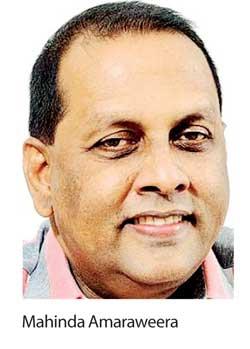01 Jun 2022 - {{hitsCtrl.values.hits}}
Preparing for the looming food crisis, Sri Lanka is aiming to become self-sufficient in rice production next year by assuring farmers with guaranteed prices, compensation for crop losses and timely supply of required fertilisers.
“I can say with responsibility that we will definitely halt rice imports following next Maha cultivation season and we will be self-sufficient in rice next year. We have already formulated a programme with inputs from all key stakeholders. Therefore, I urge all farmers to return to their cultivations without waiting for fertilisers,” Agriculture Minister Mahinda Amaraweera told the weekly Cabinet media briefing held in Colombo yesterday.
 He acknowledged that a considerable number of farmers in the country were forced to abandon their cultivation due to severe fertiliser and fuel shortages, which resulted in a significant shortfall in paddy output from key paddy-growing regions such as Polonnaruwa.
He acknowledged that a considerable number of farmers in the country were forced to abandon their cultivation due to severe fertiliser and fuel shortages, which resulted in a significant shortfall in paddy output from key paddy-growing regions such as Polonnaruwa.
Following President Gotabaya Rajapaksa’s myopic ban on importation of chemical fertiliser and agrochemicals in April last year, the rice harvest fell sharply in the 2021/22 Maha Season and the on-going Yala season, as farmers struggled to secure sufficient alternative inputs despite assurances from the government.
Further, the fuel shortage, which was triggered due to the forex crisis, also disrupted cultivation and harvesting activities during this Yala season. Despite the lifting of the ban on chemical fertiliser and agrochemical imports, the shortage of fertilisers persists due to the forex crisis and global fertiliser shortage owing to the Russia-Ukraine war.
Amaraweera revealed that top-level discussions are already underway with diplomats to import the required fertiliser stocks from India and several other countries. The government has requested 65,000 MT of fertiliser from India and Amaraweera noted that discussions are progressing in a positive direction. In addition, the government has also requested fertilisers from seven other nations through their diplomatic missions in Colombo.
Further, he noted that measures will be taken to encourage the private sector to import fertiliser, and financial support will be extended to farmers to purchase fertiliser at or above market prices.
Amaraweera plans to introduce a direct cash transfer scheme for farmers in order to assist them in purchasing fertiliser replacing the earlier fertiliser subsidy programme, which was considered to be one of most expensive and politically-sensitive policies implemented to promote rice cultivation in the country.
Meanwhile, the government has decided to import required rice stocks immediately for the interim to avert any shortages in the market.
“We have decided to import right away, instead of waiting until prices go up further in the world market,” Amaraweera stressed.
So far during the year, Sri Lanka has imported 338,000 MT of rice.
As the world is on the verge of a food crisis following the Ukraine-Russia war, Amaraweera called all Sri Lankans to cultivate some kind of food crop even in their home gardens or terraces.
He also said he requested Prime Minister Ranil Wickremesinghe to increase the expenditure on agriculture in the upcoming budget.
“We will take up the challenge of saving forex spent on food imports by growing them here. I have a lot of confidence in our farmers,” he added.
09 Nov 2024 2 hours ago
08 Nov 2024 4 hours ago
08 Nov 2024 5 hours ago
08 Nov 2024 7 hours ago
08 Nov 2024 8 hours ago